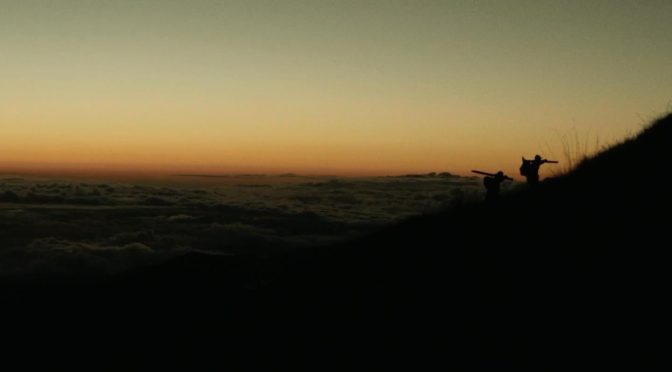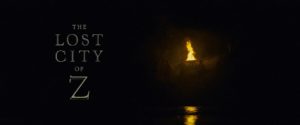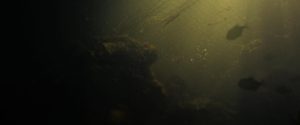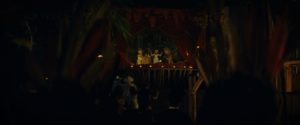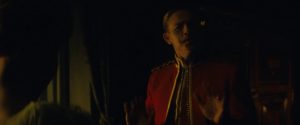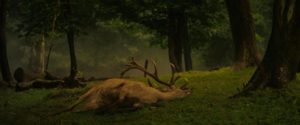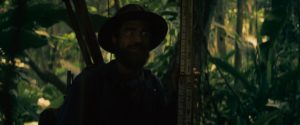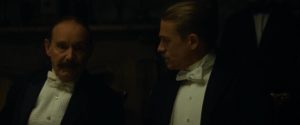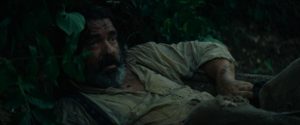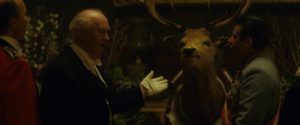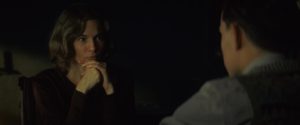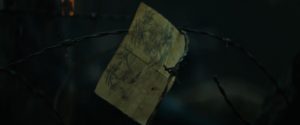I still write film reviews the way I used to write term papers as a pimply thirteen year-old. I put a line paper notepad on my desk or my table or Taco Bell’s table and I hang my head over it. I lean over it and scribble and furrow my brow, and I try to come up with the film’s main subjects. I outline like my fourth grade teacher, Mrs. Marocchi, first taught me to do. These outlines can actually be a very handy barometer for how I feel about a film’s quality. With a poor or mediocre film, the outline topics tend to be pretty superficial, less subjects than general elements one expects to find within a film. Acting. Writing. In a pinch, I might do a paragraph on how bored or entertained I was. With great films though, I can find themes or motifs or ideas. I can delve into the various ways the work made me feel and find a paragraph for each emotion. I would never want to reduce Film to a point system, as if a film’s quality hung on how many bullet points I could come up with for it. Movies are not wrestlers or Lincoln-Douglas debaters. Still, it is a good sign when a film gives me too much rich substance, too many paragraphs, to fit into a single review. For example, it’s a very good thing that, instead of using my opening paragraph to come up with some relevant anecdote or thesis to tie the whole film together (this brief explanation notwithstanding), I am going to use my introduction to state that James Gray’s The Lost City of Z (pronounced “Zed” in the film) is some of the most luscious, grand, classically sumptuous adventure film-making I have seen in some time. The level of sheer craft on display in James Gray’s soulful and stirring biography of 1900s Amazonian explorer Percy Fawcett is so beautiful, painterly and rousing in the best old-fashioned way that it could be the focus of discussion in a review of some other very good film. Alas, there are just so many rich ideas and themes in The Lost City of Z that I have no choice but to squeeze in its lovely lensing, hypnotically lavish tone, subtly mesmerizing score, and the breathtaking immediacy with which it captures its moment in history right here at the start. The film’s surface pleasures alone could take up an entire review if this were a more modest piece of work. But The Lost City of Z is one of the year’s great works of art, and so I have to place them here like little footnotes. James Gray’s film is so sharp, thoughtful, and magnificently poignant that its status as the year’s most perfectly composed period piece is really just the beautiful, gold-trimmed leather binding on a great, thick work of literature. The Lost City of Z is a true story with the sweep and emotional scope of an old classic novel; the kind of classic that, when you are finished, you may just pick back up to flip through the pages, smelling the yellowing paper and running your fingers over the odd illustration inside.
The story begins in Ireland in 1905, where a British corporal in his mid-30s named Percy Fawcett (Sons of Anarchy’s Charlie Hunnam, one of several 2017 heartthrobs giving performances that fervently demand we reconsider their potential) is stationed at the English barracks there. The soldiers are all preparing to take part in a British military tradition: a stag hunt. We see Percy’s vigor and ambition almost immediately, as he captures the day’s prize. With the stag comes a chance to meet higher ranking officers at that evening’s banquet. The chance, however, never materializes for Percy. In whispers, one man of high rank explains to another man of higher rank that Percy Fawcett comes from a disgraced family, and both take their leave before the enterprising man can approach them. We come to see much of what drives Percy Fawcett is a desperation to establish a legacy and to restore some luster to a family name that his late father tarnished through drunkenness and gambling. Percy Fawcett is not the only character important to this story. We also meet his wife, Nina (Sienna Miller in a splendid, subtly observant performance), a vivacious, confidently enlightened, and resolute woman, who does not hesitate to call out the sexist hypocrisies and injustices that are a regular part of life in Edwardian England. Percy and Nina, who Percy lovingly calls Cheeky, have a young son and they seem to hold a wistful affection for their modest, happy life, while also knowing that it is beneath someone of Percy’s military experience and accomplishment. Percy’s fate seems to be to forever labor under his father’s long, tarnished shadow. Then one day he receives the fateful order to report to London. He learns the Royal Geographical Society needs someone to mediate (and also help exploit) the border tensions in the rubber-rich tropical forests between Bolivia and Brazil, by helping to map the heretofore uncharted region. The Brazilians and Bolivians will have an allegedly neutral party to draw their border lines, Britain will be able to look into some lucrative resources, and humble Percy Fawcett will have an opportunity to lead a mission whose success could restore some piece of his family’s reputation. He will also have to leave behind his wife and young son, and will miss the birth of his second child. In the name of improving his family’s life, Percy will spend more than two years in the dense, perilous Amazon undergrowth. Along the way, Percy procures the services of Henry Costin (Robert Pattinson, as fantastically subtle and understated here as he was fantastically livewire and unhinged in this year’s Good Time), a dryly soft-spoken ex-corporal who Percy first encounters drunk a full week into their Atlantic steamship voyage, but who quickly proves himself to be a level-headed and immensely resourceful companion. They travel to Fazenda Jacobina, a rubber outpost that represents the last and furthest reaches of Western civilization into the Amazon, including an outdoor opera house all but engulfed by tropical flora. There they pick up a small crew of British men and one indigenous guide who is brought to them in chains. Percy’s first journey to map parts of the Amazon is an expectedly harrowing, grueling ordeal, complete with spear attacks, piranhas, a mutiny attempt, panthers, heatstroke, and maddening deprivation. What is less expected is that Percy comes to find ancient pottery in the jungle, possible evidence of an advanced civilization, which makes him a sudden exploratory pioneer and the talk of London when he returns. What is also unexpected, at least to anyone who has never seen a Werner Herzog film, is that this punishing land of intense heat constant danger exacts a powerful pull on Percy. He comes to fall in love with it and dreams of immediately returning in the hopes of discovering an entire lost city in the Amazon. In no time at all, having scarcely met his infant son, he is rushing back to Bolivia with Costin and another trusted crew member. He also brings along a rich donor (Braveheart’s Angus McFadyen, in a brief, brilliant portrait of pompous incompetence), who aids the mission with his social clout and woefully jeopardizes it by being weak-willed and ill-equipped for jungle hardships. Percy finds even more evidence to support his theory of advanced Amazon cultures, though the lost city remains tantalizingly out of his grasp. He returns to England to rejoin his family and then goes off to fight in World War I, but Percy Fawcett’s thoughts never stray far from the jungle, a place where he has found his life’s work and where the pretentious mutterings of British society are lost under the babble of river water and the buzz of insects. Like Timothy Treadwell, famously captured in Werner Herzog’s Grizzly Man, Percy Fawcett is a man who both finds and loses himself in a wild, dangerous place. And The Lost City of Z is a film that empathizes with his need to escape while remaining clear-eyed about the toll that obsession took on a family he left behind for so many years. James Gray’s film is by turns an impeccable turn of the century period piece, a rousing adventure story, and a gently hypnotic hymn to the siren song of the unexplored and unknown. It sees the call of discovery as something softly beautiful in its lure; less a fever dream than a hazy, warmly soothing trance.
I have already mentioned how gorgeous The Lost City of Z’s images of jungle exploration are, but there is something deeper than beautiful surfaces here. In a very classical, sweeping way, James Gray captures the rhythms of insatiable wanderlust. The editing choice that best demonstrates this is my favorite single shot in the film and leads to what is quite possibly my favorite cut in all of 2017 cinema. Percy Fawcett has just met Costin and is firmly chiding him for being intoxicated. Costin dutifully and apologetically hands over his flask of whiskey and Percy pours its last remnants into the sink. In a very tight closeup, we see a long stream of brown fluid running toward the drain. Then we cut from that stream inching forward to a steam train pushing its way into the Bolivian jungle. It’s a relatively simple, two-shot edit and I’d have to say it’s about as formally tricky as The Lost City of Z gets. But there is a tremendous power in that moment. We feel the thrill of venturing into new, uncharted places, perhaps even before Percy himself has fully felt it. The Lost City of Z is more than just a simple adventure film, and James Gray finds space to question the harms of Percy’s obsession and the wider Western world’s fixation on interloping into places it finds exotic. But Gray knows it is important that we feel the giddy intoxication of pure, uninhibited travel. He wants us to see the dazzling mirage of exploration that Percy sees and feel the breathless rush in his heart. I cannot remember when I last read one of the classic adventure books, but from the moment this film opened, with the enigmatic image of bowls full of fire flickering in the dark night above the Amazon, I recalled what it felt like to read Robinson Crusoe or Treasure Island. The implications and consequences of Percy’s Amazon adventures are complex, but it is crucial to Gray that we feel the enthusiastic, almost boyish spirit of discovery that Percy feels in his soul, even in moments where his life is in great danger. The Lost City of Z is an utterly empathetic film. It does not doubt that we may judge Percy Fawcett for his single-minded obsession with finding Z, but it does ask that we let ourselves get swept up in his daydream first. More than asking us, the film positively whisks us away to that place until we cannot help but share his awe-struck curiosity.
And if falling under the enchantment of an adventurer’s life is the key to understanding and feel for Percy Fawcett, even in his most pig-headedly trying moments, it is equally important that we get a sense of the itchy straitjacket of 1900s British society that he is wriggling out of. Part of what makes Charlie Hunnam such a wonder in this role is that he uses his volatile, rough-hewn charm to suggest a man chafing at a society that routinely dismisses him. I imagine Hunnam, a heretofore mostly unsung actor, can relate to having more potential than most people can immediately see. I confess to having been one of those people. Percy Fawcett is a man of tremendous drive and keen intelligence, but the harsh social pecking order of this time tells him that his fate was sealed decades ago when his father chose to lose the Fawcett name at the bottom of a bottle. Even the Royal Geographical Society’s decision to give Fawcett the Bolivia mission feels like an attempt to foist a dangerous, thankless job on a man the British military sees as a bit of an embarrassing afterthought. At best, Fawcett may come back with some small handful of clout. At best, he may one day die with the black mark finally scrubbed clean. He may dare to dream of breaking even. Both Percy and Cheeky immediately pop against the drab, restrictive landscape of Edwardian values. They are nuanced, sensitively played characters and we quickly grasp that both are blessed and cursed with an awareness of the ridiculous unfairness of the hierarchical system they are sentenced to spend their days in. “I know the medals are ridiculous, Cheeky,” Percy says about his hunger to finally have some brooch pinned on him after years of service. Then he adds, “But they may be our only chance.” Understanding and seeing the unjust whims of one’s society does not mean that one can alter them or be entirely untouched by them. Percy and Cheeky have intelligence, integrity, and a spark of good-natured humor about their circumstances; about this arbitrary thicket of social climbers and family legacies. But all the grace and wisdom in the world really only enables them to sing in their chains. These are multi-faceted, vibrant human beings who pop against the drab backdrop of their rigid society, and I cannot decide whether that makes their plight more or less tragic. The Fawcetts would write an extraordinary story together. Percy’s discoveries in the Amazon would upend the West’s condescending notions about tribal cultures. He would achieve more real acclaim and historical importance than someone in his social position could have dreamt possible. But for all he achieved, Percy could never entirely escape the desire to gain the approval of men who had long ago declared themselves above him. For all that he knew better, their patronizing stares followed him. And for all the boundless freedom he pursued and found in the South American wilds, there was always a sad undercurrent of desperation and inferiority pushing him along. He found as much liberty and joyful escape as any British man living in his day ever could. But, much as Lawrence of Arabia’s T.E. Lawrence learned, there is no such thing as infinite liberty and escape only lasts if we never have to go back where we came from. Like many a great Werner Herzog film, The Lost City of Z finds a potent mixture of elation and melancholy in one man’s attempt to define and find himself outside of society’s strict codes.
For as much pathos as James Gray finds in Percy Fawcett’s bittersweet odyssey to discover some great truth beyond the petty materialism and social strata of Edwardian England, the most sorrowful fact may be that Percy himself is still very much a product of his time and place. It is not just that Percy cannot entirely escape England’s classist mores, but that he cannot fully free his own mind from the ignorance around him. Percy is a thoughtful, rigorous, good-hearted man in ways that many of his snobbier peers are not, yet he reacts in apopleptic disbelief when Cheeky suggests that she might come along with him on his travels. He is a man able to advance theories that enlighten minds about indigenous cultures. He even has the humility to concede to his own arrogance when he learns that some tribes have advanced farming systems. But the hypocrisy of refusing to fully see that a woman could be an explorer escapes him. Even as Cheeky raises their family alone for years at a time and teaches herself celestial navigation and even unearths the key piece of research in Percy’s great anthropological theory, he cannot come to see the full strength of this brilliant, stalwart woman. In some sense, even when we are with Percy in the Amazon, The Lost City of Z is Cheeky’s story. If Percy Fawcett had to voyage a continent away into the perilous jungle to find dignity and some relief from the stifling class realities of 1900s England, he at least had that jungle. But the greatest marvel of fortitude and grace in the film is Cheeky, who had to spend years away from her husband and had to bear that separation while also toiling under the daily humiliation of being a woman in a time when women were thought capable of so very little. This vibrant, observant, dynamic woman surely knew that a more just society was on the way. Perhaps she could sense suffrage and employment and feminism just over the next crest in the hill, but she had to stay where she was. She had to see it in her imagination. In the film’s heart-stoppingly beautiful final shot, we are left to contemplate a woman who hoped to find her own adventures, her own space, but instead had to settle for exploring the uncharted depths of her own unappreciated mind.
The Lost City of Z is a film with a genuine affection for human curiosity and a frank, generous, and clear-eyed understanding of the constraints that compel us to wander and explore. It is a film about both the freedom of open spaces and the harsh authority of borders. Physical borders, societal borders, and mental borders. It is a film about questing for some sense of wondrous freedom within the cages of our realities, and the fact that it is about questing for liberty within our limitations makes it feel fitting that it finds such vivacity, beauty, and real emotion within something as well-worn as the adventure film or the British period piece. Like this year’s Mudbound, The Lost City of Z is a film less interested in reinventing the wheel of old-fashioned epic cinema than embracing its classic design features and smoothing them out to perfection. It is a dramatically enthralling tale of exploration and a sumptuously mounted, splendidly acted look at turn-of-the-century England, and what is most vital is that it shakes every last bit of wax from those old, reliable genres. It finds rich, psychologically complex people under the costumes and poignant, nuanced motivations beneath the derring-do. What James Gray has crafted here is masterful. A film about trying to buck the system that restores the lustrous good name of traditional cinema.
